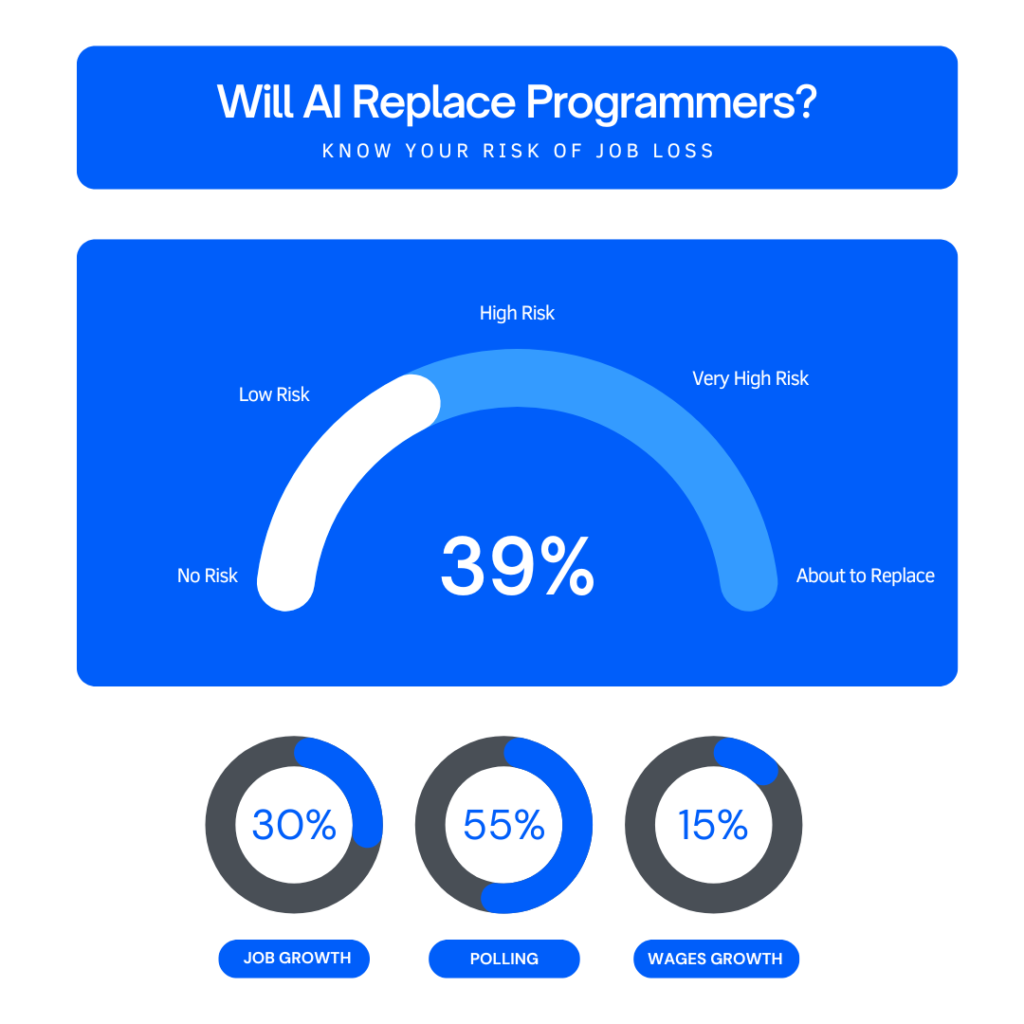
is a subject that remains relevant today. This investigation is not only theoretical; it
explores the core of the nature of work in the future and the impact of AI on industry
transformation. We’ll cover a range of topics as we go through this discussion, including
user viewpoints, growth opportunities, employment security and hazards, and possible
salary impacts. In the middle of AI’s expanding capabilities, programmers have a
complex conversation ahead of them that requires thought and consideration.
Programmers are the architects of the digital world, wielding their coding expertise to
bring software and applications to life. They possess a unique blend of creativity and
analytical skills, problem-solving complex issues with precision and innovation. These
tech-savvy individuals play a crucial role in developing cutting-edge technologies that
power our everyday lives.
From designing websites to creating intricate algorithms, programmers are versatile
professionals who adapt to ever-evolving technology trends. Their ability to write
efficient code and troubleshoot errors is essential for ensuring seamless functionality in
the digital landscape. With a keen eye for detail, programmers meticulously craft
solutions that enhance user experiences and drive technological advancements
forward.
In a fast-paced industry where innovation is key, programmers serve as pioneers
pushing boundaries and reshaping the way we interact with technology. Their passion
for coding fuels progress and enables ground-breaking developments that shape the
future of society at large.
It seems unlikely that AI technologies will replace programmers totally in the near
future, even if they may improve and augment programmers’ work. Because of the
unique mix of human imagination, intelligence, and skill of software creation,
programmers will always be crucial to creating the digital world of the future.
But as AI improves, the nature of computing job can change, needing workers to learn
new methods and tools.
Employment Increase in term of Job Growth
There will probably be more work jobs in areas like AI research, data science, machine
learning engineering, and AI ethics as the technology improves. To create, build, and
oversee AI systems in these areas in a responsible and ethical way, human skills will be
necessary.
In addition, there will likely be a greater need for skilled coders and AI experts, which
might result in increased pay as companies fight for the best people in these areas. To
help workers adjust to the changing labour market, officials and business leaders must
address worries about job loss and promise that they have access to programs for
education and training.
We’re running a user poll to gather thoughts on a vital topic: the possible impact of
artificial intelligence (AI) on computer jobs. Your opinion counts, so please take a
moment to share your ideas on whether AI
We’re running a user poll to gather thoughts on a vital topic: the possible impact of
artificial intelligence (AI) on computer jobs. Your opinion counts, so please take a
moment to share your ideas on whether AI Will replace coders in the near future.
Artificial intelligence, or AI, is very clever, yet it is still not as good as people in certain
areas. It has Trouble, for instance, with jobs needing innovation, understanding human
needs, moral judgment, Handling complicated systems, speaking clearly, and coming
up with original ideas. Therefore, AI cannot Fully handle jobs that require these skills,
such as problem-solving, knowing user needs, ensuring Program safety and fairness,
understanding complicated computer systems, dealing with clients and Co-workers,
and idea creation.
Certainly, here are some job roles within programming where AI currently struggles to
fully replace human Expertise:
Creative Problem Solver:
AI may struggle to replicate the creative thinking and instincts needed to solve difficult
problems Effectively.
User Experience Designer:
Understanding and empathizing with user needs to create simple and user-friendly
software takes human Understanding and empathy.
Ethical Decision Maker:
Making ethical choices about software development, considering social effect, privacy
issues, and Fairness, needs human reasoning and values.
Systems Architect:
Understanding complicated systems and designs and creating sturdy and scalable
solutions often takes Deep human knowledge.
Communication Specialist:
Effective communication and teamwork with team members, partners, and clients are
important for Successful software development, which AI may struggle to duplicate.
Innovator and Visionary:
Driving innovation in computing by discovering new ideas, trying, and pushing the limits
of what’s possible Often stems from human imagination and vision.
While AI holds great potential to change the field of programming, its full effect and
implications are yet to Be fully realized. The future of programming will likely involve a
mutual connection between humans and AI, where each compliments the strengths
and solves for the limits of the other, eventually leading to a More efficient, creative, and
innovative approach to software development.
On the other hand, sceptics raise worries about the limits and social effects of AI in
programming. While AI can handle certain parts of coding, it lacks the subtle
knowledge, imagination, and insight that human Coders bring to the table. Additionally,
there are social factors involving the use of AI in programming, Such as bias in
algorithms, privacy issues, and job loss.